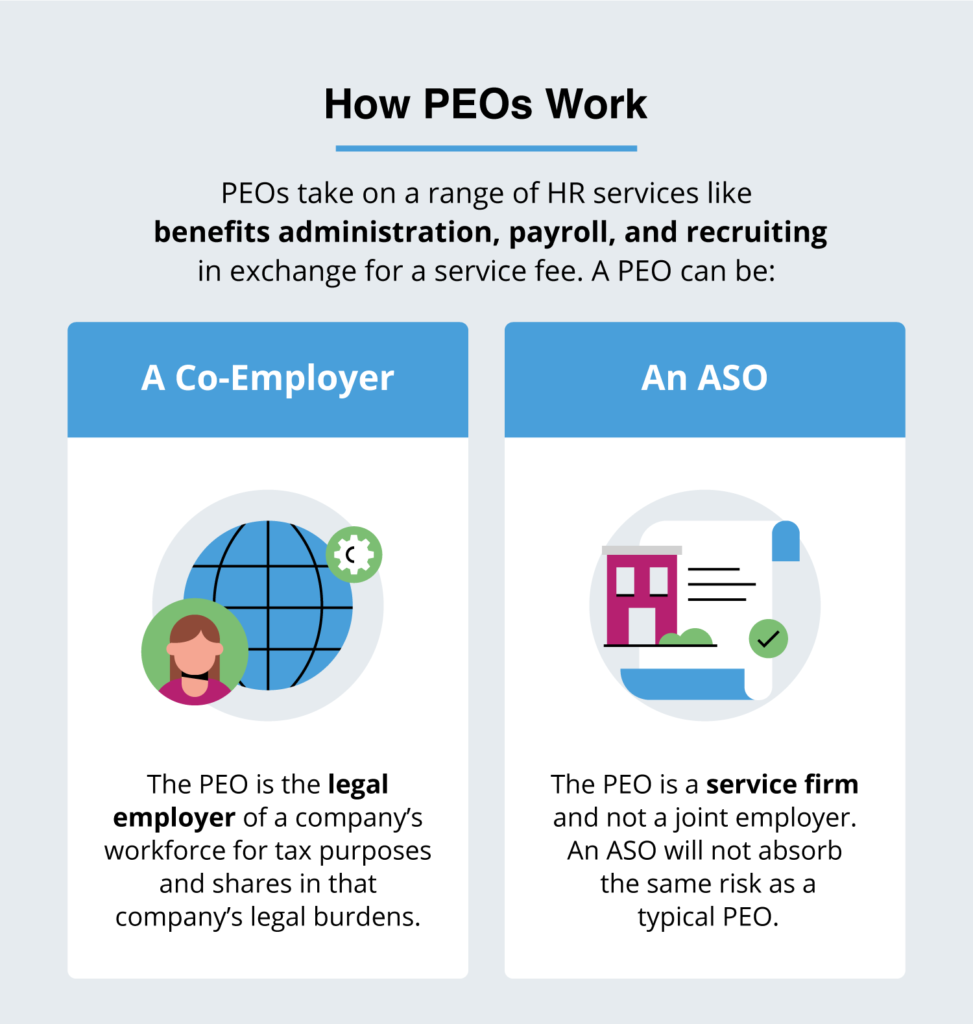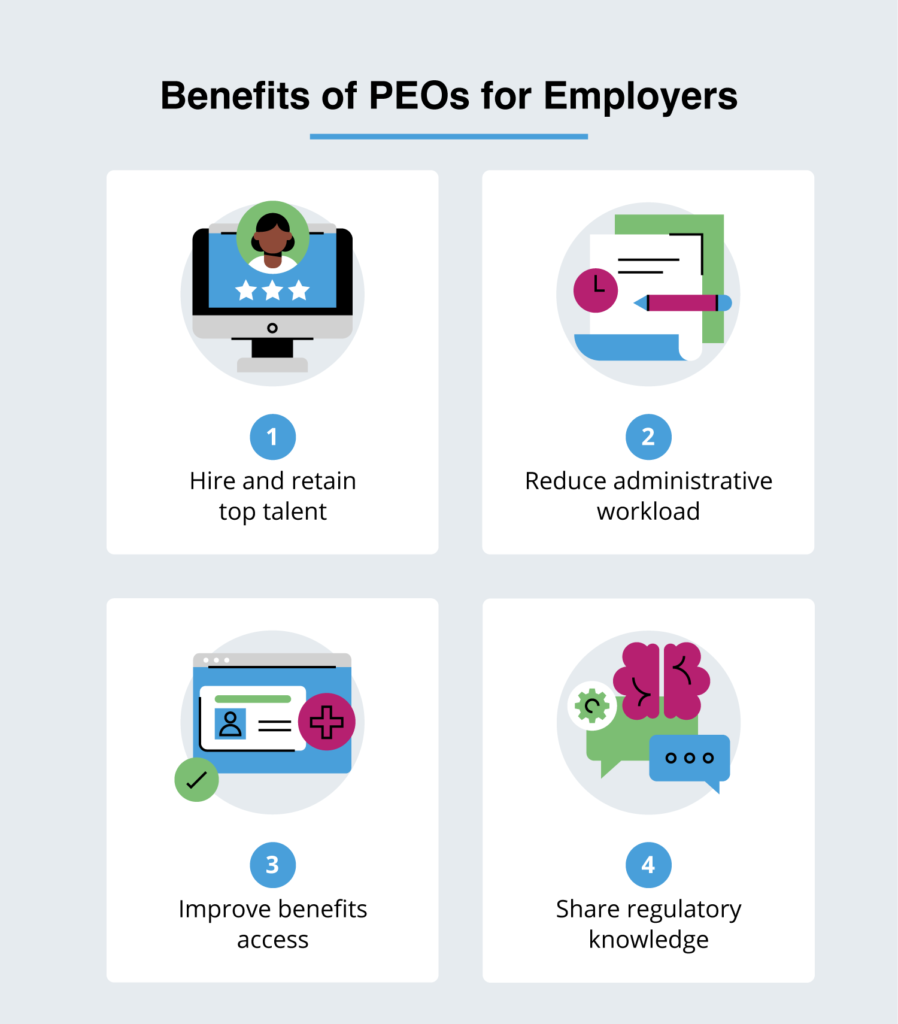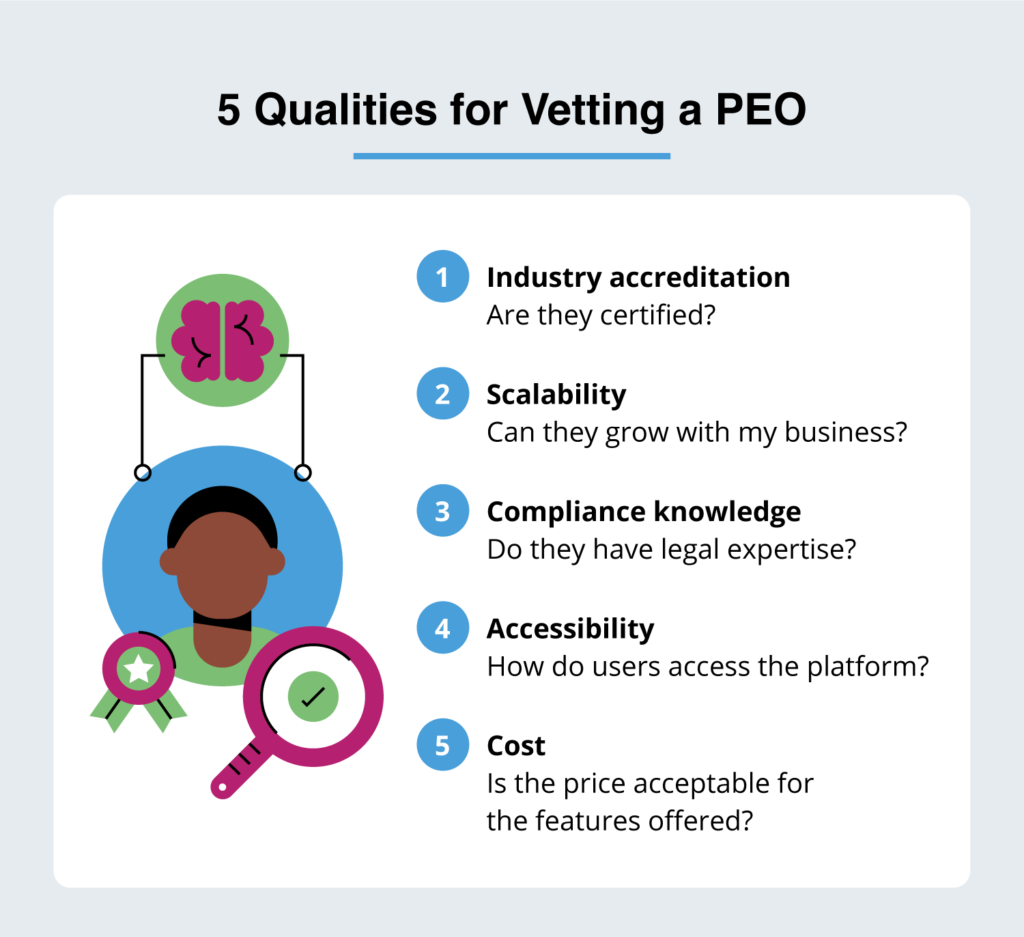Choosing a PEO can grant your company access to top-tier benefits and increase your ability to hire and retain top talent.
In this guide, we answer the question: what does PEO stand for? We also go over what a PEO does, why they’re a great HR choice for companies with limited resources, and which questions you should ask when choosing a PEO.
What is a PEO?
A PEO (professional employer organization) is an organization that helps companies quickly hire full-time talent both domestically and abroad.
PEOs are co-employers, meaning they partner with companies by acting as the legal employer of a workforce for tax purposes while the company maintains day-to-day decision-making power.
How does a PEO work?

A PEO is a B2B service company that allows its clients to outsource a range of employee management tasks, including:
- Employee benefits
- Payroll and workers’ comp
- Recruiting
- Risk management
- Training
A PEO will typically charge a service fee based on a percentage of the employee’s total compensation. This can happen in two different ways: via co-employment (or joint employment) or via an administrative services organization (ASO).
1. Co-employment or joint employment
In a co-employer relationship, the PEO actually becomes the employer of record (EOR) of their client’s employees for tax and benefits purposes. The client company still retains control of the day-to-day activities of their employees, but all employee administrative tasks, including payroll and benefits, are handled by the PEO.
The benefit of joint employment is greatly reduced rates on all HR-related expenses due to client pooling. The PEO takes all the employees of their clients and pools them to help drive down rates on things like insurance, payroll, training, and risk. The pooling method is particularly important when getting better workers' compensation insurance rates.
2. ASO
An ASO is a service firm that could fall under the PEO umbrella but may be more of a parallel service. ASOs provide outsourced employee management services, but they don’t practice joint employment. A company that engages with an ASO will still remain the EOR for its employees. The ASO helps with whatever HR management tasks the business needs.
An ASO can still provide value by saving companies time on HR tasks and getting better rates for benefits, insurance, and payroll.
Other PEO variations
PEO is a broad term that applies to various types of service providers. A PEO could also be:
- An umbrella company. Protections like IR35 exist in the U.K. to close contractor tax loopholes. Contractors may join an umbrella company to decrease their tax and compliance risk.
- A pass-through agency. Pass-through agencies act as the EOR for independent contractors but do not find work for them. They help contractors manage their taxes, insurance, payroll, and more to save time.
- A financial intermediary. This type of EOR is most common for home health care workers for disabled persons, and exists so neither the patient nor the government agency providing funding acts as the EOR for these workers.
An international PEO. Companies can use international PEOs to quickly hire full-time employees abroad without having to create or maintain a foreign subsidiary.
Why choose a PEO? 4 ways PEOs help businesses

With so many outsourcing options available, you might wonder why a business would use a PEO. PEOs offer valuable guidance that enables you to focus more of your time and energy on your company’s growth.
In addition to general HR support, PEOs help companies manage their:
- Benefits administration
- Compliance and risk
- Payroll and taxes
- Workforce
PEOs are especially helpful for small and mid-sized businesses without the capabilities or expertise to manage all of these variables for a distributed workforce.
Here are four ways that PEOs help businesses reach their full potential.
1. Hire and retain top talent
Any employer knows that attracting superstar talent in a competitive market is a challenge. PEOs offer smaller and medium-sized businesses access to Fortune 500-level employee benefits, increasing the likelihood that job postings entice top talent. With 73% of employees saying they’d stick around at their current role if they were offered better benefits, PEOs can help you retain that talent, too.
2. Reduce administrative workload
Managing administrative duties when you’ve got a business to run can be headache-inducing. Partnering with a PEO allows you to take a step back and focus on big-picture items that might’ve otherwise been overlooked.
3. Improve access to benefits
PEOs typically pool employees from partner companies in order to give those companies access to the same benefits afforded to much larger organizations. This means that with a PEO partner, a 50-person company can access some of the same benefits as a 5,500-person firm.
The PEO also handles benefits enrollment and claims processing, so your employees reap the rewards while you avoid any drawbacks.
4. Share regulatory knowledge
Most PEOs employ compliance experts who are able to help your business avoid costly regulatory penalties and fines with knowledge sharing. Typical compliance areas include hiring and HR, workers’ compensation, unemployment insurance, and payroll.
How to choose a PEO: 5 questions to ask

There are many PEOs available for businesses, but not all are created equally. You should know your business’s needs before you decide on a PEO so that you find one that offers the features you want.
Consider these questions as you hunt for a PEO that suits your business:
- Does the PEO have IRS certification and/or industry accreditation?
- Can the PEO offer more services and scale with you as your business grows?
- What is the PEO’s level of team expertise related to legal compliance?
- Does the PEO offer a user portal for online access?
- What is the cost structure for the PEO’s services and is it subject to change?
Aim to get a complete understanding of how a PEO will partner with your organization and help you achieve your goals. If a particular PEO isn’t scalable with your business model, accredited, accessible, or knowledgeable, you’re better off looking elsewhere for a partnership.
PEO FAQs
What does PEO stand for?
PEO stands for “professional employer organization” because a PEO acts as a hiring intermediary between employers and organizations.
How much does a PEO cost?
It’s common for a PEO to charge a percentage of payroll. Some PEOs change their fee based on how many people your company employs.
What's the difference between a PEO vs. EOR?
The primary difference between a PEO vs. EOR is that a PEO acts as a co-employer, while an EOR is the total employer of a company’s distributed workforce.
What’s the difference between a PEO and a payroll company?
The main difference between a PEO and a payroll service provider (PSP) is that a PEO offers support for payroll administration and compliance while also providing other HR services and sharing a company’s legal burden. A PSP does not handle other HR services or share legal liability.
What’s the difference between a PEO and a staffing company?
The biggest difference between a PEO and a staffing company is that staffing companies remain the employer of their workforce and lease talent to other companies. PEOs don’t provide companies with talent like a staffing company, but instead provide HR support and operate as a co-employer of a company’s workforce.
What’s the difference between a PEO and outsourcing HR?
The clearest difference between partnering with a PEO and outsourcing your HR department is that a PEO typically includes access to high-quality benefits plans. Outsourcing your HR department usually just involves administrative assistance without access to better benefits.
Is a PEO a good idea?
A PEO is a good idea to boost employees’ experience in the workplace and alleviate your burden of providing them with administrative and HR support. A PEO can help you turn your focus to mentoring and managing your workforce and improving company culture instead of being bogged down with administrative work.
Who is the employer in a PEO?
A PEO is a co-employer, meaning that the PEO is the legal employer of your workforce for tax purposes, but you retain the authority to run your business and make day-to-day decisions.
Find a PEO that’s right for your business
When you expand your presence to another country, you face complex challenges to maintain compliance while navigating new laws around hiring, payroll, and more.
As a world-leading international PEO partner, Velocity Global’s Employer of Record (EOR) solution has helped hundreds of organizations expand into over 185 countries without a headache—and we can do the same for your organization.
Whether you’re hiring employees in Germany or considering opening an office in Vietnam, Velocity Global helps you go global with ease, speed, and compliance.
Ready to take the first step? Let’s get started.



